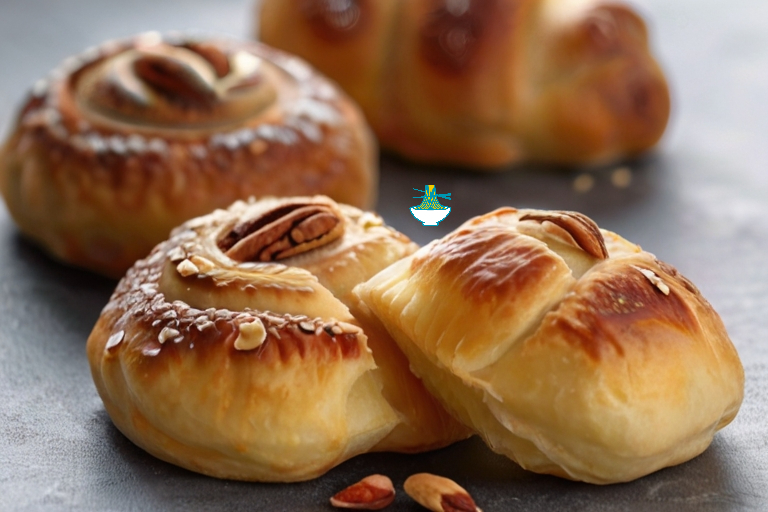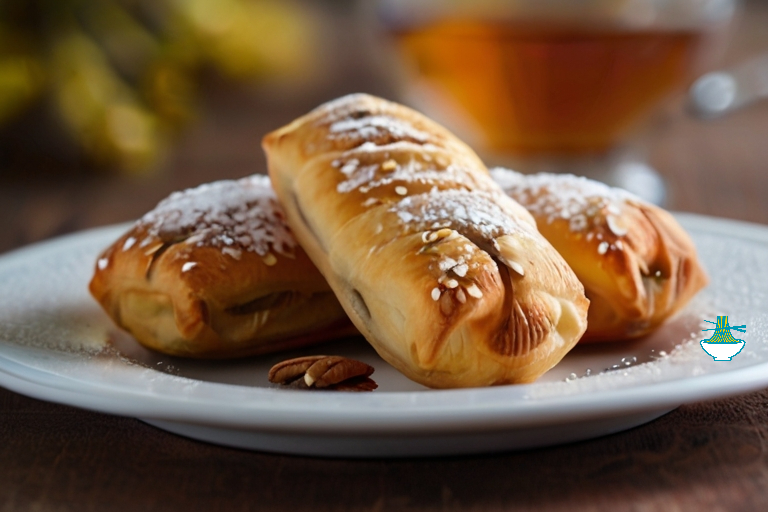Indulge in the delectable world of Cypriot cuisine with Cyprus Daktyla, a traditional sweet treat renowned for its irresistible taste and cultural significance. Named after its distinctive finger-like shape, Daktyla encapsulates the essence of Mediterranean flavors and culinary heritage.
This delightful dessert comprises layers of thin pastry dough, meticulously rolled and filled with a generous mixture of nuts, such as almonds or walnuts, along with fragrant spices like cinnamon and cloves. After being carefully shaped into small, elongated cylinders, the Daktyla are baked to golden perfection and then lovingly coated with a sweet syrup, infusing each bite with a heavenly sweetness.
Beyond its sumptuous taste, Cyprus Daktyla carries a rich history that dates back generations, symbolizing familial traditions and festive celebrations. Whether enjoyed during weddings, religious festivals, or everyday gatherings, this beloved delicacy serves as a centerpiece of Cypriot hospitality and cultural pride.
Embark on a culinary journey to Cyprus and savor the exquisite flavors of Daktyla, a timeless confectionery treasure cherished by locals and travelers alike. With its crispy exterior, nutty filling, and syrupy finish, every bite of Cyprus Daktyla promises to transport you to the sun-kissed shores of the Mediterranean, where tradition and taste intertwine in perfect harmony.

Here's a recipe for Cyprus Daktyla:
Ingredients:
For the pastry:
- 1 pound (about 450g) phyllo dough, thawed if frozen
- 1 cup (2 sticks or 226g) unsalted butter, melted
- 1/2 cup (120ml) vegetable oil
For the filling:
- 2 cups (200g) finely chopped almonds or walnuts (or a combination)
- 1/4 cup (50g) granulated sugar
- 1 teaspoon ground cinnamon
- 1/4 teaspoon ground cloves
- Zest of 1 lemon
- 1 tablespoon lemon juice
For the syrup:
- 1 cup (240ml) water
- 1 cup (200g) granulated sugar
- 1 tablespoon honey
- 1 cinnamon stick
- 1 strip of lemon peel
Instructions:
1- Preheat your oven to 350°F (175°C). Prepare a baking sheet lined with parchment paper.
2- In a bowl, mix together the chopped nuts, sugar, cinnamon, cloves, lemon zest, and lemon juice to make the filling.
3- Unroll the phyllo dough and cover it with a damp towel to prevent it from drying out. Take one sheet of phyllo dough and brush it lightly with melted butter and oil mixture. Place another sheet on top and repeat until you have 4 layers.
4- Cut the layered phyllo dough into strips about 3 inches wide. Place a small spoonful of the nut filling at the end of each strip, then fold over the dough to enclose the filling, creating a triangle shape. Continue folding the dough in a triangular shape until you reach the end of the strip.
5- Place the filled triangles on the prepared baking sheet, seam side down. Brush the tops lightly with the butter and oil mixture.
6- Bake in the preheated oven for 20-25 minutes or until golden brown and crispy.
7- While the pastries are baking, prepare the syrup. In a saucepan, combine water, sugar, honey, cinnamon stick, and lemon peel. Bring to a boil, then reduce the heat and simmer for about 10 minutes until slightly thickened.
8- Once the pastries are baked, remove them from the oven and immediately pour the syrup over them while they are still hot. Allow the pastries to soak up the syrup for a few minutes.
9- Let the pastries cool completely before serving. Enjoy your delicious Cyprus Daktyla!
This recipe yields approximately 20-24 pastries, depending on the size of your phyllo dough sheets and how you cut them. Adjust quantities as needed for your desired yield.
Nutritional Value:
here are approximate nutritional values for the ingredients used in Cyprus Daktyla:
Phyllo Dough (per 1 sheet):
- Calories: 60-70 kcal
- Carbohydrates: 12-15g
- Fat: 0.5-1.5g
- Protein: 1-2g
benefits:
- Phyllo dough is low in fat and cholesterol, making it a healthier alternative to other types of pastry dough.
- It provides carbohydrates, which are a primary source of energy for the body.
- Phyllo dough contains small amounts of protein, contributing to muscle repair and growth.
Almonds (per 1 ounce/28g):
- Calories: 160 kcal
- Carbohydrates: 6g
- Fat: 14g
- Saturated Fat: 1g
- Monounsaturated Fat: 9g
- Polyunsaturated Fat: 3.5g
- Protein: 6g
- Fiber: 3g
benefits:
- Almonds are rich in healthy fats, particularly monounsaturated fats, which can help lower bad cholesterol levels and reduce the risk of heart disease.
- They are a good source of protein, providing essential amino acids necessary for various bodily functions.
- Almonds are high in fiber, promoting digestive health and aiding in weight management by increasing feelings of fullness.
Walnuts (per 1 ounce/28g):
- Calories: 185 kcal
- Carbohydrates: 4g
- Fat: 18g
- Saturated Fat: 1.5g
- Monounsaturated Fat: 2.5g
- Polyunsaturated Fat: 13g
- Protein: 4g
- Fiber: 2g
benefits:
- Walnuts are packed with omega-3 fatty acids, which have anti-inflammatory properties and are beneficial for heart health.
- They contain antioxidants such as polyphenols and vitamin E, which help protect cells from damage caused by free radicals.
- Walnuts are a good source of protein and fiber, promoting satiety and supporting overall digestive health.
Cinnamon (per 1 teaspoon):
- Calories: 6 kcal
- Carbohydrates: 2g
- Fiber: 1g
- No fat or protein
benefits:
- Cinnamon has antioxidant properties that help fight inflammation and protect against oxidative stress.
- It may help lower blood sugar levels by improving insulin sensitivity and increasing glucose metabolism.
- Cinnamon has been linked to improved heart health by lowering cholesterol and triglyceride levels and reducing the risk of heart disease.
Please note that these values are approximate and can vary based on factors such as brand, portion size, and preparation method


Comments